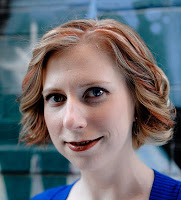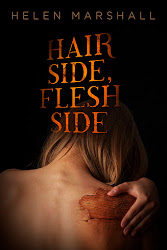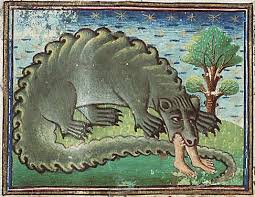 When I was a kid I genuinely thought everyone who wrote books had died a long time ago. Like the dinosaurs. I had never seen a writer. I figured people didn’t write books anymore.
When I was a kid I genuinely thought everyone who wrote books had died a long time ago. Like the dinosaurs. I had never seen a writer. I figured people didn’t write books anymore.
(soon-to-be Dr) Helen Marshall
When Lisa Hannett returned from WFC in Toronto last year, one of the books she kept talking about was Helen Marshall’s Hair Side, Flesh Side (Good title, I thought). ‘Who’s Helen Marshall,’ I asked in all innocence, knowing that as she was Canadian I was disposed towards liking her anyway. Let’s face it, no one dislikes Canadians, even if the Americans do grumble and shake their heads in bewilderment at their northern neighbours’ insistence on universal health care and unfailing politeness. A Canadian of my acquaintance once asserted that you could be kidnapped in the Middle East, then allowed out of the getaway vehicle on the next corner with an apology after the kidnappers realised you were Canadian. It’s true, they’re just adorable.
But back to Helen Marshall: she’s the Aurora-winning author of Skeleton Leaves, a retelling of Peter Pan; she not only writes, but edits as well; the recipient of many Canadian creative arts granty/awardy things; her work has appeared in various literary locations, including ChiZine, Paper Crow, Abyss and Apex, Lady Churchill’s Rosebud Wristlet, and Tor.com; and Hair Side, Flesh Side has been short-listed for a 2013 Aurora Award, and long-listed for the Frank O’Connor International Short Story Prize. Not only that, January Magazine listed HS, FS in its “Best F/SF Books of 2012”, describing it thusly: “Sometimes you hear people talking about the new face of horror. Well huddle closer, children. Hair Side, Flesh Side is it. . . . Marshall’s stories are frightening, touching, quirky, sexy and deeply lyrical. The 15 stories each seem deeply grounded in reality, making the otherworldly explorations all the more real.”
So, all of that is a long-winded way of saying I bought her book. Unfortunately, the Book  Goblin who resides in my library liked the look of it, so the book disappeared for a good while … so long, in fact, that I bought a second copy. Two days ago, the first copy reappeared on the shelf where I’d looked for it in vain. Between its pages I found a review from the Book Goblin. Thus it came to pass that I had two copies of Hair Side, Flesh Side – which means I will be giving a copy away. At the end of the interview I’ll tell you how to win.
Goblin who resides in my library liked the look of it, so the book disappeared for a good while … so long, in fact, that I bought a second copy. Two days ago, the first copy reappeared on the shelf where I’d looked for it in vain. Between its pages I found a review from the Book Goblin. Thus it came to pass that I had two copies of Hair Side, Flesh Side – which means I will be giving a copy away. At the end of the interview I’ll tell you how to win.
1. So, a PhD – why??? I have one too, and know that my answer must involve alcohol, desperation, a scholarship offer, and a bet, which I may or may not have lost. I do hope your answer involves a dive in Marrakesh, a man with a gold tooth, and the Maltese Falcon …
All I can say is, my mother is a pathologist and I was trying like Hell to avoid the family business.
That’s only partially true. I started doing a PhD in medieval studies, largely for the reasons most people do: I didn’t know better, there was money in it, and I was fluent in ecclesiastical Latin.
I’ve loved most of the process though. In what other field could you spend two weeks in a cathedral library measuring punctuation marks in six-hundred-year-old books on a hunch? Where else could you read about the Cult of the Holy Foreskin? And, most importantly, where else would the Canadian government pay you to spend two years in Oxford studying the effects of the Black Death on book production?
 2. In “Blessed” the first story in Hair Side, Flesh Side you show a culture where kids are given saints for birthday presents. OMG. And how did that idea come about?
2. In “Blessed” the first story in Hair Side, Flesh Side you show a culture where kids are given saints for birthday presents. OMG. And how did that idea come about?
At the time, I was working on a dissertation chapter about the legends of medieval saints, and there’s always been something that struck me as intrinsically fascinating about the treatment of their bodies as relics. I remember the first time I went to Venice and saw the mosaics on St. Mark’s Cathedral depicting a team of Venetians who stole the body of St. Mark the Evangelist because they thought it would be, essentially, a big tourist draw. At the time, my older brother was involved in a custody battle, and I just thought, “Wouldn’t it be really funny if…?” That’s how most of my stories start. In my head, they seem hilarious. In everyone else’s they seem to be horror.
3. How do you strike a balance between writing, editing and studying for the PhD?
With a great deal of difficulty. For the last six months, I’ve managed largely by stepping back from editing, and locking myself in the Pontifical Institute for Medieval Studies library for at least six hours a day to work on my dissertation. I find about once every three weeks, a story will emerge in my head, fully formed, and force its way out, Athena-style—leaving me mostly catatonic for the writing process. The clearest example of this happened a couple of months on the day I was coming back from Mexico. I woke up at 6:00 am with a few lines in my head. And then I wrote. And wrote. And wrote. I couldn’t hold proper conversations. I didn’t respond to questions. Laura had to essentially smuggle me through customs and make sure I didn’t leave my passport with the security guards because I was no help at all. Really, I owe my freedom from a Mexican prison to her.
The balance shifts though. I’m scheduled to submit my dissertation on September 1, after which I expect I’ll be able to turn my attention to some creative projects that have been sitting on the backburner. I’ve been putting together a poetry chapbook entitled The Sex Lives of Monsters for around that time, and then it’s back to fiction!
4. When did your love of books begin? And is it merely love or has it tripped over into obsession?
I owe that to my mother, I think, which is good because I could have ended up with her obsession—dead bodies. But she got all of us reading at a very early age. I was the kid who loved the road trip part of family vacations best because it meant I’d have hours of reading time. At university I realized people might pay me to read books. In graduate school I realized people might pay me to write them.
5. What was the first book/poem that made you think ‘I want to do that’?
Probably Guy Gavriel Kay’s Fionavar Tapestries. I read his books to pieces when I was a kid and, in retrospect, it probably explains my trajectory into medieval studies in Toronto.
But I grew up in small-town Canada. I also read the Greek and Norse myths, and medieval histories, and accounts of the Fall of Rome. That sort of thing. When I was a kid I genuinely thought everyone who wrote books had died a long time ago. Like the dinosaurs. I had never seen a writer. I figured people didn’t write books anymore. There must have been some sort of literary mass extinction in the nineteenth century. It took me some time to figure out that I could do that. That people were still doing that.
6. If you could choose to live in the Medieval period, precisely where and when would you choose? Try to narrow it down to the nearest Tuesday.
I’d have to strike off the whole of the fourteenth century for starters. Seriously. No one wants to go to the fourteenth century. I’m pretty sure the Black Plague was just an excuse for fifty percent of the population to bail. But, you know, Thursday, 24 October 1415 wouldn’t be too bad. Knowing how the Battle of Agincourt turns out wouldn’t hurt—I could place some very hefty bets.
7. How did you come to be associated with ChiZine Publications? What’s the best part of working with them? The worst?
See, this is the somewhat more convoluted story; my sister Laura had just moved back from Edinburgh. She was living on my floor at the time in an almost-bedroom my roommate and I had constructed out of curtains in the dining room. She signed up as a volunteer for a writing festival to try to snag a job. I dropped by after volleyball practice, and ran into Sandra Kasturi and Brett Savory at a table where they were selling the first round of CZP books. I offered to do some work for free. They offered to pay me. Everyone was happy except Laura—who didn’t find a job and had to sleep on the floor for another eight months (ha ha).
The best part of work with CZP is that it’s exciting: they’re deeply committed to putting out good books; in many ways we all had to learn as we went; and they’re family. The worst part? The hangovers.
8. “Sanditon”, about a ‘found’ Jane Austen manuscript is wondrous strange. Do all editors have a good book inside them – literally?
I would have to say… probably not. Editing is a really different skill than writing. When you write, you try to find the good book inside of you and turn it into a manuscript. When you edit, you try to find the good book inside the manuscript and bring that into the world. In some ways, the necessary skills of the editor can interfere with the writing process, which, at least in my case, is very fluid and instinctual.
At the same time, a good editor is worth his or her weight in gold. They can see stories in ways that writers can’t. They’re a bit like chiropractors. You don’t know exactly what they do, but they can put a bit of pressure on one element of a story then, CRACK!, you wince and you scream, but suddenly everything works much better.
9. Which is your favourite story in Hair Side, Flesh Side? Oh, c’mon, you can tell us …
The problem with this question, I find, is that what I remember most about a story is the process of writing it rather than what it’s like to read it. “Sanditon” was a breakthrough story for me, both psychologically and in terms of craft. It was one of those stories where I was genuinely trying to figure something out. Its pseudo-companion piece, “The Book of Judgement”, is also one of my favourites just because I like the strange, recursive narrative voice. I like playing with narrators who lie, mostly, because when you read a story you are at the mercy of whoever is telling it. You have to depend on them for the rules. When a narrator lies, it screws up the entire process of reading. For me, that’s just… very very funny. But it’s also clever because it forces the reader to find new ways of reading.
10. So, what’s next for soon-to-be Dr Helen?
I’m currently finishing off a follow-up collection of stories entitled Gifts for the One Who Comes After scheduled for release in September 2014 from ChiZine Publications. It seems to be about the themes of legacy and what we pass on to our children. It will feature some wicked prophesying, a disappearing silk top hat, what lies on the other side of a mother’s bellybutton, a floating bull shark who may or may not be the angel of Death, a very sad can of tomato soup, a telescope that can reveal the past, a phantom thumb, and at least one happy ending. I hope.
After that, I’m going to turn to my first novel, Icarus Kids, about a world where children come back from the dead. With wings. It’s sort of a strange apocalyptic-zombie-angel mash-up.
And, of course, I’m absolutely thrilled to be moving for the UK for two years to take up a postdoctoral fellowship at Oxford University!
TO WIN: a copy of Helen’s Hair Side, Flesh Side (and the Book Goblin’s review) send me an email on me@angelaslatter.com and tell me who won the Battle of Agincourt – it’s easy, people, that’s what Google’s for … and who came second. Closing date: 10 June 2013.




